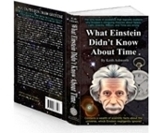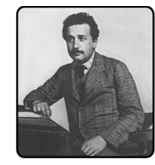-
Was Einstein the first physicist to publish a scientific paper on the theory of relativity?
-
Was Einstein the first physicist to allege that the rate at which time elapses within the universe is not absolute but varies in order to preserve the invariant speed of light?
-
Was Einstein the first physicist to suggest that the speed at which time elapses is dependent on the speed at which a material body moves?
-
Was Einstein the first physicist to allege that the linear dimension of a body varies in accordance with changes in its velocity?
-
Did Einstein discover that the speed of light is a universal constant that never varies with respect to either a moving emitter or a moving receiver of light?
-
Was Einstein the first physicist to claim that nothing can travel faster than the speed of light?
-
Was Einstein the first physicist to allege that gravitational effects will modify the trajectory of a beam of light?
-
Was Einstein the first physicist to suggest that energy is equivalent to mass?
-
Was Einstein the first physicist to allege that the mass of an object varies in accordance with changes in its velocity?
-
Did Einstein’s pioneering work usher in the atomic age?
-
Did Einstein’s celebrated equation E = mc2 help scientists to develop the atomic bomb?
-
Was Einstein’s happiest thought about a man falling freely through a gravitational field factually correct?
-
Did Einstein derive the concept of four-dimensional space-time?
-
Did Einstein prove that gravity warps the fabric of space?
-
Did Einstein prove that the rate at which time elapses is governed by the gravitational mass of a planet, star, or other massive cosmic entity?
-
Did Einstein discover that the universe is expanding?
-
Do Einstein’s theories validate the enthralling assumption that time travel is a practical possibility?
-
Did Einstein originate quantum theory?
-
Did Einstein participate in the development of the theory of quantum mechanics?
-
Was Einstein the ultimate genius whose revolutionary ideas transformed our understanding of the laws of physics during the early decades of the twentieth-century?
There is only one answer to each of the questions that are listed above and it is an emphatic ‘no’! If you incorrectly answered yes to any of the aforementioned questions then you need to reserve a copy of ‘What Einstein Didn’t Know About Time’ because the diverse and informative contents will enable you to impartially review Einstein's allegedly profound contribution to science. You'll then be able to judge for yourself whether the claims that have been made by countless theoretical physicists who assert that Einstein had been endowed with the gifted brain of an eccentric genius are valid.

 Patent Office allegedly read the inscrutable mind of God. Since then, the name Albert Einstein has become synonymous with the word ‘genius’. However, until now, the majority of ordinary people who are prepared to believe that Einstein’s mind might have glimpsed aspects of reality that had remained shrouded in mystery since the dawn of creation have never been encouraged to judge his allegedly profound intellectual achievements objectively. Instead, they have arrogantly been told what to believe by an elite group of high-flying theoretical physicists whose interests are best served by perpetuating the Einstein myth. Therefore, despite the fact that you may genuinely believe that you have not been adversely affected by the preponderance of sycophantic hype that sustains the myth, if you wish to discover whether your understanding of Einstein’s contribution to human knowledge is any greater than that of the average man in the street, just answer yes or no to the following twenty simple questions and then check out the answers that follow.
Patent Office allegedly read the inscrutable mind of God. Since then, the name Albert Einstein has become synonymous with the word ‘genius’. However, until now, the majority of ordinary people who are prepared to believe that Einstein’s mind might have glimpsed aspects of reality that had remained shrouded in mystery since the dawn of creation have never been encouraged to judge his allegedly profound intellectual achievements objectively. Instead, they have arrogantly been told what to believe by an elite group of high-flying theoretical physicists whose interests are best served by perpetuating the Einstein myth. Therefore, despite the fact that you may genuinely believe that you have not been adversely affected by the preponderance of sycophantic hype that sustains the myth, if you wish to discover whether your understanding of Einstein’s contribution to human knowledge is any greater than that of the average man in the street, just answer yes or no to the following twenty simple questions and then check out the answers that follow.